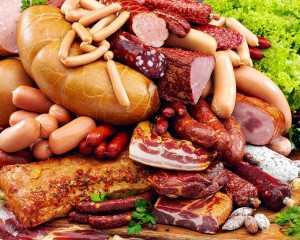|
Getting your Trinity Audio player ready...
|
By Nikita Mehta Courtesy of Live Mint
The World Health Organization (WHO) on Monday flagged cancer risks from processed meat and red meat.
The International Agency for Research on Cancer (IARC) under WHO classified processed meat products as carcinogenic to humans, citing evidence that their consumption causes colorectal cancer.
The agency also classified red meat as “probably carcinogenic” since the evidence on this count is limited.
These findings were published on Monday after a working group of 22 experts from 10 countries, as part of the IARC Monographs Programme, reviewed the accumulated scientific literature. Processed meat was classified as carcinogenic to humans (Group 1) which is in the same category as tobacco and asbestos after the group of experts found “sufficient evidence”.
There are 117 agents in Group 1. In Group 2A, there are 74 agents which are classified as “probably carcinogenic to humans”, including lead compounds and DDT insecticide. The IARC Monographs Programme, which identifies and evaluates environmental causes of cancer in humans, has till date reviewed more than 900 agents.
Processed meat includes meat that has been transformed through salting, curing, fermentation, smoking or other processes to enhance flavour or improve preservation, according to IARC.
This could include hotdogs or frankfurters, ham, sausages, corned beef, and biltong or beef jerky as well as canned meat and meat-based preparations and sauces.
The experts concluded that each 50 gram portion of processed meat eaten daily increases the risk of colorectal cancer by 18%. “For an individual, the risk of developing colorectal cancer because of their consumption of processed meat remains small, but this risk increases with the amount of meat consumed,” says Kurt Straif, head of the IARC Monographs Programme. “In view of the large number of people who consume processed meat, the global impact on cancer incidence is of public health importance,” added Straif.
The group of experts assessed more than 800 studies that looked at associations of more than a dozen types of cancer with the consumption of red meat or processed meat in many countries and populations with diverse diets. The most significant evidence came from large prospective cohort studies conducted over the past 20 years.
Christopher Wild, director of IARC, however, added that red meat has nutritional value. “Therefore, these results are important in enabling governments and global regulatory agencies to conduct risk assessments, in order to balance the risks and benefits of eating red meat and processed meat and to provide the best possible dietary recommendations,” Wild said.
“Fortunately in India we are not very large consumers of processed meat in terms of bacon and sausages, which have been named specifically by WHO on the basis of epidemiological studies. But there are other forms of processed meats and red meat that have also has been named which we consume,” said Srinath Reddy, president of Public Health Foundation of India.
He said Indians consume good amount of fruits and vegetables and, therefore, have traditionally had good protection against bowel cancer. But now fruit consumption is decreasing and that of red meat is increasing, Reddy said.
“The government can help by ensuring misleading advertising around unhealthy food products reduces, healthy food products become affordable and unhealthy foods become pricier,” Reddy added.














